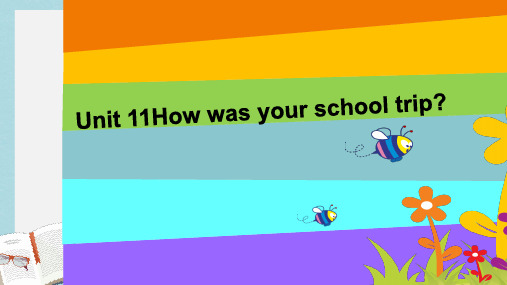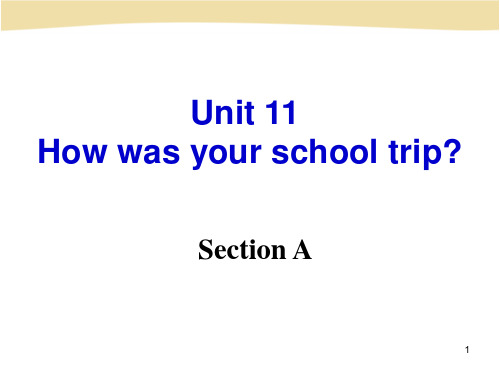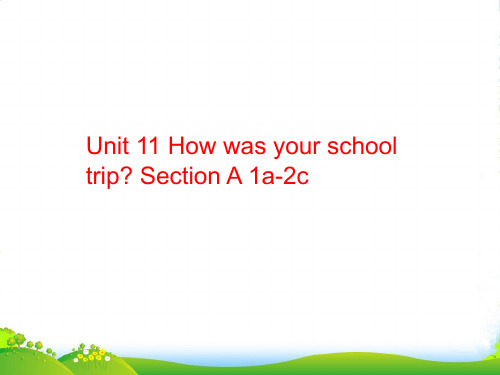人教版初中英语七年级英语下Unit11全单元课件
合集下载
人教版七年级下教学课件:Unit 11

That girl likes to take photos of herself with her cell phone. 那个女孩喜欢用手t was an exciting day. 总之,这是令 人兴奋的一天。
All in all 相当于汉语中的“总的说来;总之;整 体上说”,用来对所阐述的内容进行概括性总结 及归纳。例如:
令人激动的 22. lovely adj. 可爱的 23. expensive adj. 昂贵的 24. cheap adj. 廉价的;便宜的
25. slow adj. 缓慢的;迟缓的 26. fast adv. & adj. 快地(的) 27. robot n. 机器人 28. guide n. 导游;向导 29. gift n. 礼物;赠品 30. everything pron. 所有事物;一切
13. yesterday adv. 昨天 14. flower n. 花 15. worry v. & n. 担心;担忧 16. luckily adv. 幸运地;好运地 17. sun n. 太阳 18. museum n. 博物馆
19. fire n. 火;火灾 20. painting n. 油画;绘画 21. exciting adj. 使人兴奋的;
All in all, I think you did a good job. 总的来说, 我认为你干得很好。
7. anything pron. (常用于否定句 或疑问句)任何东西;任何事物 8. grow v. 种植;生长;发育 9. farm n. 农场 v. 务农;种田 10. pick v. 采;摘 11. excellent adj. 极好的;优秀的 12. countryside n. 乡村;农村
All in all 相当于汉语中的“总的说来;总之;整 体上说”,用来对所阐述的内容进行概括性总结 及归纳。例如:
令人激动的 22. lovely adj. 可爱的 23. expensive adj. 昂贵的 24. cheap adj. 廉价的;便宜的
25. slow adj. 缓慢的;迟缓的 26. fast adv. & adj. 快地(的) 27. robot n. 机器人 28. guide n. 导游;向导 29. gift n. 礼物;赠品 30. everything pron. 所有事物;一切
13. yesterday adv. 昨天 14. flower n. 花 15. worry v. & n. 担心;担忧 16. luckily adv. 幸运地;好运地 17. sun n. 太阳 18. museum n. 博物馆
19. fire n. 火;火灾 20. painting n. 油画;绘画 21. exciting adj. 使人兴奋的;
All in all, I think you did a good job. 总的来说, 我认为你干得很好。
7. anything pron. (常用于否定句 或疑问句)任何东西;任何事物 8. grow v. 种植;生长;发育 9. farm n. 农场 v. 务农;种田 10. pick v. 采;摘 11. excellent adj. 极好的;优秀的 12. countryside n. 乡村;农村
人教版七年级下-unit11-Section-B-2a-2c-(共20张PPT)

cool
___ hot _√__ lucky ___ large___ expensive __ terrible _√__delicious _√__ great
___ cheap ___ fast
Tell a story with the description words: Last summer I went to Hong Kong. It was an
What does Helen think of her school trip? Great. How about Jim? Terrible
Why?
2c Read the diaries again and complete
the chart. How do Helen and Jim describe these things?
Group work: role play Helen/Jim, and her/his parents, and make a conversation according to the diary entries.
Possible questions: Did you have a good time, dear? How was your school trip? How did you go there? What did you see? What did you do?
It is about their trips.
Helen
Jim
Check your predictions by reading the first and last sentences. Tip: The first or the last sentence
七年级英语下册人教版Unit_11_How_was_your_school_trip_全单元课件

2. photo ____p_h_o_t_o(s 复数) 3. take ____b__ri_n_g(反义词)
4. put _____p_u_t_(过去式) 5. pour ____p_o_u_r_in(g现在分词)
6. wish _____w_i_sh_(es 复数) 7. fun ____f_u_n_n_y(形容词)
选择填空 1. ___B_ Emily at her aunt’s last night?
A. Is B. Was C. Did 2. ____C_ he sleep late last night?
A. Is B. Was C. Did 3. My mother _______Csome cakes for us
TF
2c PAIRWORK
A: What did Carol do? B: She picked some strawberries.
2d Role-play the conversation.
Key phrases
1. I saw quite a lot. 我看见许多(牛)。 quite adv. 相当;十分;很 例如: She sings quite well. 她唱得非常好。
• feed sth to sb 把食物喂给某人/物 • feed sb on / with sth 喂某人/物食物
• take a photo / picture ( of sb/sth) •
1b Listen and circle the three things Carol did on
her school trip in 1a.
some trees and _____p_l_a(ypelady) some games after that.
4. put _____p_u_t_(过去式) 5. pour ____p_o_u_r_in(g现在分词)
6. wish _____w_i_sh_(es 复数) 7. fun ____f_u_n_n_y(形容词)
选择填空 1. ___B_ Emily at her aunt’s last night?
A. Is B. Was C. Did 2. ____C_ he sleep late last night?
A. Is B. Was C. Did 3. My mother _______Csome cakes for us
TF
2c PAIRWORK
A: What did Carol do? B: She picked some strawberries.
2d Role-play the conversation.
Key phrases
1. I saw quite a lot. 我看见许多(牛)。 quite adv. 相当;十分;很 例如: She sings quite well. 她唱得非常好。
• feed sth to sb 把食物喂给某人/物 • feed sb on / with sth 喂某人/物食物
• take a photo / picture ( of sb/sth) •
1b Listen and circle the three things Carol did on
her school trip in 1a.
some trees and _____p_l_a(ypelady) some games after that.
人教版英语七年级下册第十一单元SectionAPPT课件

How _w__a_s_ (is) your school trip yesterday? _D__id__ (do) you __g_o__ (go) to the zoo? __D_i_d_ (do) you take any photos? _D__id__ (do) you __s_a_w_ (see) any interesting animals? I _w_e_n_t_ (go) to the zoo last year and it _w__a_s_
33
动词原形 go take have eat hang see
动词过去式 went took had ate hung saw
34
动词原形 动词过去式
live do cry put watch visit play drop plan
lived did cried put watched visited played dropped planned
bought a souvenir
7
hung out with friends
8Байду номын сангаас
played basketball
played soccer
9
went fishing
went skateboarding
10
took photos
ate some ice cream
11
had a hamburger
12
cleaned the room
watched TV
13
1a. Match the phrases with the pictures.
1. went for a walk __e__ 2. milked a cow __b__ 3. rode a horse __a__ 4. fed chickens __c__ 5. talked with a farmer __f__ 6. took some photos __d__
33
动词原形 go take have eat hang see
动词过去式 went took had ate hung saw
34
动词原形 动词过去式
live do cry put watch visit play drop plan
lived did cried put watched visited played dropped planned
bought a souvenir
7
hung out with friends
8Байду номын сангаас
played basketball
played soccer
9
went fishing
went skateboarding
10
took photos
ate some ice cream
11
had a hamburger
12
cleaned the room
watched TV
13
1a. Match the phrases with the pictures.
1. went for a walk __e__ 2. milked a cow __b__ 3. rode a horse __a__ 4. fed chickens __c__ 5. talked with a farmer __f__ 6. took some photos __d__
新人教版英语七年级下册第十一单元全部课件

3. What _d_i_d_ they _d_o__ (do) on the school trip? They _r_o_d_e_ (ride) horses and _c_l_im__b_e_d_
(climb) the mountains.
4. How _w_a_s_ their school trip? It _w__a_s_ interesting. _D_i_d_ she __g_o_ (go) fishing? Yes, she did.
my grandparents in the countryside. Peter: Oh, nice. What did you do?
Eric: I went fishing every day. And I fed the
chickens with my grandpa. It was so
C. will be
D. have been
1.Write the new words and expressions in Section A.
2.Write a short passage about Carol’s school trip.
Section A 2a-2d
➢ Objectives
long-distance running?
--Yes, he ____dd_idi_d_.
go
10. –Where _____ Tina’s family ____ (go)
last summwenr?t
--They _______ (go) to New York for
their vacation.
3. I was very busy last week. (改否定句和一般疑问句)
(climb) the mountains.
4. How _w_a_s_ their school trip? It _w__a_s_ interesting. _D_i_d_ she __g_o_ (go) fishing? Yes, she did.
my grandparents in the countryside. Peter: Oh, nice. What did you do?
Eric: I went fishing every day. And I fed the
chickens with my grandpa. It was so
C. will be
D. have been
1.Write the new words and expressions in Section A.
2.Write a short passage about Carol’s school trip.
Section A 2a-2d
➢ Objectives
long-distance running?
--Yes, he ____dd_idi_d_.
go
10. –Where _____ Tina’s family ____ (go)
last summwenr?t
--They _______ (go) to New York for
their vacation.
3. I was very busy last week. (改否定句和一般疑问句)
Unit 11 单元知识点复习课件 人教版七年级英语下册

5. quite a lot 相当多;许多 ✓ quite 作副词,意为“相当;完全”。 ✓ a lot 后面不能直接跟名词,a lot of 相当于lots of,其后可接可数名词复数或不可数名词。 ✓ quite a lot意为“许多”,如果后面接名词, 则用quite a lot of。
【辨析】quite与very
walk作动词,“走路;散步”,后接地点名 词时,要加上介词to,其后接here,there,home 等地点副词时,不加介词to。
Your home is near the school, so you can walk home. We walk to school every day.
2. milked a cow 给奶牛挤奶 ✓ milk 在此处作动词,意为“挤奶”。
拓展not at all单独使用时的用法: ① 可作为当别人表示感谢的应答语,意为“不
客气;不用谢”。 — Thank you very much. — Not at all.
② 可作为别人称赞或带感谢性质的客套语,意 为“别客气”。 — It’s very kind of you. — Not at all.
含义
总的来说
all in all
总共,合计
句子位置/适用句型
常用于句首 句首或句末
in all at all
根本
常用于否定句中 not (…) at all 根本不
他们总共筹集了一万元。 They raised 10,000 yuan _i_n_a_l_l__.
总的来说,她是一位优秀的老师。 __A_ll__in__a_ll_, she is an excellent teacher.
_________ .
最新人教版初中七年级英语下册Unit 11 第十一单元课件PPT

1C Ask and answer questions about Carol’s school trip.
A: Did Carol take any photos? B: Yes, she did.
Look at the pictures below. Where did they go on vacation?
went to Tibet
stayed at home and played computer games
visited my grandparents
went to summer camp
went to fish
went to a party
visited museums
1a Match the phrases with the pictures.
Homework
Write a report about your last vacation.
Unit 11 How was your school trip?
Section A
Period 2 2a ~ 2d
根据首字母或汉语提示完成句子。
1. He is an e_x_c_el_l_en_t__ student in our school. He often gets good grades(分数)in the exam. 2. The children helped the farmer to p_ic_k____ up oranges on the farm last weekend. 3. The old people like living in the c_o_u_n_tr_y_s_id_e_ because it is quiet(安静的). 4. I am very tired, so I don’t like to do a_n_y_th_i_n_g___ at all. 5. My parents g_ro__w_____ lots of vegetables in the garden.
新人教版七年级英语下册unit11全单元分课时课件(共129张ppt)

观察与思考
Bob: Hi, Carol. How was your school trip yesterday? Carol: It was great!
Bob: Did you go to the zoo?
Carol: No, I didn’t. I went to a farm. Look, here are my photos.
What do you do? What do you do? Feed some chickens. Feed some chickens.
Talk with a farmer. Take some photos. Take some photos.
How wasschyouorl stcrhipoo学l t校r旅ip行?
went for a walk
My last trip
milked a cow
My last trip
rode a horse
My last trip
fed chickens
My last trip
talked with a farmer
My last trip
took some photos
___ Did you grow any apples?
√ ___ Do they grow apples?
___ Did you eat them?
___ Were they good?
√
2b Listen again. Circle T for true or F
for false.
1. The farmer showed Carol around the farm.
Bob: Did you ask him any questions?
人教版七年级英语下册unit11课件

sitcoms =situationscomedies
soap s/o operas
1b. Listen. What does Mark think of TV shows? 1. ___loves b
a 2. ___likes
c 3. ___doesn’t mind
d 4. ___ doesn’t like
e 5. ___ can’t stand
Sports shows
News
Soap operas
Talk shows
Sitcoms Cartoons
Lucy
likes
loves
doesn’t mind doesn’t like
likes
can’t stand loves
doesn’t like doesn’t mind
1.搜集自己喜欢的电视节目的相关资料。 (包括电视栏目名称,主持人以及播出时间) 2.收集整理自己喜欢的时尚物…
What do you think of game shows?
t talk shows
What do you think of sitcoms?
I l ove t hem . I l i ke t hem . I don’t m nd. i I don’t l i ke t hem . I can’t s t and.
sitcoms = situation comedies
cartoon shows
ads
What kinds of TV shows…?
What do you think of sports shows?
I l ove t hem . I l i ke t hem . I don’t m nd. i
人教版七年级下册第十一单元Section A 1a—2c(共21张PPT)

Talk about your trip!
When did you go? (last year、in 2014、last winter)
Where did you go? What did you do? How was the weather? How was your trip? .............
milk a cow feed chickens
take some photos go for a walk talk with a farmer
now
What is she doing now? She is riding a horse......
on weekends
What does she do on weekends? She rides a horse on weekends
Student B: Yes, he did.
3a Here is Jim’s and Bill’s letters. Let’s help them to complete the letters.
Dear Bill, How w__a_s (is) your school trip yesterday? D__id_ (Do) you _g_o_ (go) to the zoo? D__id_ (do) you take any photos? _D_i_d (Do) you _se_e_ (see) any interesting animals? I _w_e_n_t (go) to the zoo last year and it _w_a_s_ (is) a lot of fun.
last weekend
What did she do last weekend? She rode a horse last weekend.
人教版英语七年级下册:Unit 11 Period 1(共36张ppt)

Chinese teacher
loves
English teacher
Math teacher
likes
Science teacher
P.E. teacher
Give a report like this:
Peter loves … , he doesn’t like …
Homework :
1. Write your report . 2. 找一些自己喜欢的电视主持 人或喜欢的电视演员的图片.
I love them .
What do you think of sports shows ?
I like them .
What do you think of sitcoms ?
I don’t mind them .
What do you think of talk shows ?
I don’t like them .
What do you think of soap operas ?
I can’t stand them .
A: What do you think of … ?
B : I … them .
Make your own conversations .
A :What do you think of game shows ? B :I don’t like them . C : What does he /she think of game shows ? D :He/She doesn’t like them .
Alan
loves
likes
doesn’t like
likes
2b Listen and fill in the blanks.
- 1、下载文档前请自行甄别文档内容的完整性,平台不提供额外的编辑、内容补充、找答案等附加服务。
- 2、"仅部分预览"的文档,不可在线预览部分如存在完整性等问题,可反馈申请退款(可完整预览的文档不适用该条件!)。
- 3、如文档侵犯您的权益,请联系客服反馈,我们会尽快为您处理(人工客服工作时间:9:00-18:30)。
went for a walk
milked a cow
rode a horse
fed chickens
talked with a farmer took some photos
1. Did you see any cows? Yes, I did. I saw quite a lot.
quiet a lot (相当多)+of+可数或不可数, 也 可以单独使用。 quite a little 相当多+不可数名词 quite a few 相当多+可数名词
2b Listen again. Circle T for true or F for false.
1 The farmer showed Carol around the farm. T F
2 Carol learned a lot about farming. T F
3 The farmers grow strawberries from December
Did he/she......yesterday? Yes, he/she did. No,he /she didn't.
watch the stars play tennis
1b Listen and circle the three things Carol did on her school trip in 1a.
2020年6月23日
7
二、一般过去时的结构(可分三类不同的结构)
1. Be动词的一般过去时
am/is ---was are---were
(1)肯定句式:主语 + was / were + 其它.
(2)否定句式:主语 + wasn’t /weren’t+ 其它.
wasn’t=was not
weren’t=were not
_D__id_ you go to the zoo? No, I didn’t.
2a Listen and check the questions you hear.
What did the farmer say? Did you grow any apples? √ What did you see? √ Do they grow apples? Did you learn anything? Did you eat them? √ Did you ask him any questions? √ Were they good?
(1)
(2)
否定句:I didn‘t ride a horse last Sunday.
一般疑问句:
Did you ride a horse last Sunday? 肯定回答:Yes, I did. 否定回答:No, I didn't. 特殊疑问句:
(1)What did you do last Sunday? (2)When did you ride a horse?
to June. T F
4 The farmers don’t grow apples. T F
5 Carol picked some strawberries
and took them home.
TF
2c Ask and answer questions about Carol’s visit to the farm. A: What did Carol do? B: She picked some strawberries.
e.g. 我们喝了不少牛奶。 We drank quite a lot of milk. 我看到了相当多的奶牛。 I saw quite a lot of cows. 夏天我经常打网球。 I play tennis quite a lot in the summer. 不少学生迟到了。 Quite a few students were late.
i,
再加 –ed。 口诀:一加ed,二加d,三要双写,
四注意,y变成ied,特殊形式特殊记。
2.不规则动词的过去式需特殊记忆。
am(is)
was are(是)
were
can(能)
could do/does(做,干) did
have (has)(有)had go(走)
went
come(来) came feed (喂)
fed
buy (买) bought eat(吃)
ate
grow(生长) grew ride (骑)
rode
run(跑)
ran say (说)
said
see (看见) saw get(变得,到达) got
teach(教) taught take(带)
took
swim(游泳) swam learn(学习)
2d Role-play the conversation.
Peter: Hi, Eric. How was your trip last week?
Eric: It was excellent. I visited my grandparents in the countryside.
Peter: Oh, nice. What did you do? Eric: I went fishing every day.
What did they d__o_ last weekend? Theyp_i_c_k_e_d_s_o_m__e_s_tr_a_w__b_e_r_r_ie_s_. How w__e_r_e the strawberries? They were delicious.
What did you do last month? I w_e_n_t_ to the countryside.
Peter: Lucky you.
2. It was so much fun.
fun表示“有趣的事情”,为不可数名词。 e.g. Look, Peter. The children are having
so much fun. 3. Lucky you! 你真幸运! 这是一句非正式口语,相当于You’re so lucky. Lucky之后的人称还可以改为me, him。
(2)否定句式:主语 + didn’t + v原形+ 其它.
【did not = didn’t】
(3)一般疑问句:Did + 主语+ v原形+ 其它? 肯定回答:Yes,主语+did. 否定回答:No,主语+did’t.
(4)特殊疑问词+did+主语+v.原形+其他?
肯定句:I rode a horse last Sunday.
(3)一般疑问句:Was/Were + 主语 + 其它?
肯定回答:Yes,主语+ was / were .
否定回答:No,主语+ wasn’t /weren’t.
(4)特殊疑问词+was/were+主语+其他?
肯定句:The air was clean yesterday. 否定句:The air wasn't clean yesterday. 一般疑问句:
三、动词过去式的构成 清念 /t/, 元浊/d/;
1. 1)
一规般则情动况词下的,过在去动式词原形后/t面/ /d加/ 之-ed后。念/id/
2)以不发音e结尾的动词,在词尾直接加-d。
3)以重读闭音节(即辅音+元音+辅音)末
尾只有一个辅音字母的动词,要先双写这个
辅音字母后,再加 –ed。
4)以“辅音字母+ y”结尾的动词,先将 y 改为
study studied
worry worried
play played
live
lived
stop stopped
Did you......yesterday? Yes,I did./No,I didn't.
play basketball
watch TV
play computer games
talk with a farmer stay at home
1c Ask and answer questions about Carol’s school trip.
A: Did Carol take any photos? B: Yes, she did. A: Did Carol ride a horse? B: A: Did Carol talk with the farmer? B:
And I fed the chickens with my grandpa. It was so much fun.
Peter: Sounds good. How was the weather there?
Eric: It was great, and the air was so clean. I watched the stars at night. They were so beautiful.
3a Here is Jim’s and Bill’s letters. Let’s help them to complete the
A: How was your school trip? B: It was … (boring/interesting/good/great…) A: What did you do on the school trip? B: I went for a walk with my classmates.
What did you do last weekend?
I…… feed chickens fed chickens
